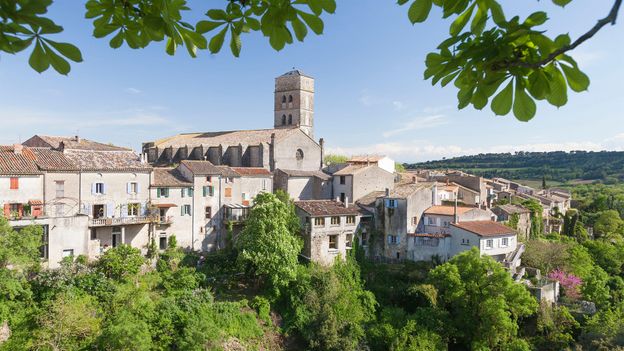Rob Kleiss, my host for the night, also spent more than a decade living above his bookshop, Abélard. His former abode is now home to a plethora of books in various stages of well-loved battery, waiting to be restored or shipped; he lives across the way in a building he purchased in 2017, transforming it into a book-lovers’ bed and breakfast. My loft-like room on the second floor was awash with light, illuminating the leather-bound books atop the mantle and on shelves built into nooks and crannies. Antique caricatures decorated the bathroom walls, and from the window, I glimpsed the aptly named Chapters restaurant, still bustling at 21:00. At the other end of the room, a cosy chair was placed before a window revealing the Black Mountain in the distance, the sky awash with starlight.
These views were part of what brought Englishman Adrian Mould to Montolieu. After more than a decade working for the trade union of the tiny local Cabardès wine appellation, known for is unique combination of Mediterranean and Atlantic grapes, Mould opened his wine cellar in 2011. “I have a very regular and loyal local clientele,” he said. “Generally, booksellers like wine.”
The village is saddled between two rivers, the Dure and the Alzeau, which Mould says, “bring it a lot of energy”. Indeed, the power of the water made it a 19th-Century textile centre, and at one point, six paper mills dotted the banks of the Dure. The 300-person village of Brousses-et-Villaret, a 15-minute drive away, is home to the last one still in use in all of Occitanie, and the morning after my stay at Abélard, I drove into the fog-shrouded hills and trekked along the surging river to the mill, where Céline Durand Viyer was waiting.
Durand Viyer is part of the seventh generation of the Chaïla family, which has produced paper and then cardboard here since 1877. When her grandfather retired in 1981, it seemed the family trade would be lost, until Braibant’s widow implored Durand Viyer’s uncle, André Durand, to take up the torch, which he did in 1994. Today, Durand Viyer is responsible for many of the mill’s administrative tasks, joking that she works “in paperwork, but not the same kind”. She knows her family’s ancestral trade well enough to lead enlightening guided tours, which the mill offers in addition to frequent paper-making workshops.










